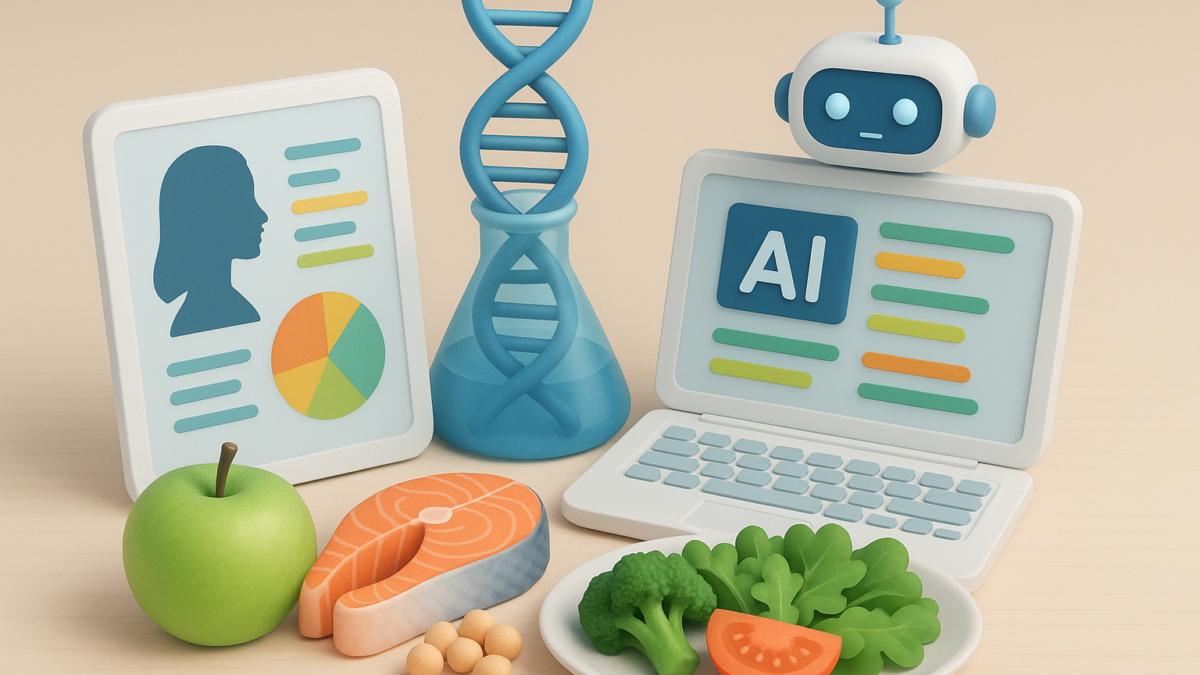Personalized Nutrition in 2025: How AI and Genomics Are Shaping the Future of Diet
Table of Contents
Introduction: The End of One-Size-Fits-All Diets
For decades, nutrition advice has been built around general guidelines—eat more vegetables, limit sugar, balance calories. But in 2025, this one-size-fits-all approach is quickly becoming outdated. Advances in genomics, AI, and wearable technology are paving the way for personalized nutrition—diets tailored not just to lifestyle, but to your DNA, gut microbiome, and unique health profile.
This shift is more than a wellness trend; it’s a MedTech-driven transformation redefining how individuals and healthcare providers think about food, diet, and long-term health.
Why Personalized Nutrition Matters
Every individual metabolizes food differently. Two people eating the same meal may experience completely different blood sugar responses, energy levels, or nutrient absorption.
This variability makes traditional diet plans less effective. The rise of personalized nutrition offers:
- Better Health Outcomes: Customized diets reduce risks of obesity, diabetes, and cardiovascular disease.
- Preventive Care: Nutrition aligned with genetics can help identify vulnerabilities before they become chronic issues.
- Higher Compliance: People are more likely to stick with diets when they’re tailored to their bodies and preferences.
The Role of Genomics in Diet Planning
Genomics is at the heart of personalized nutrition. By analyzing a person’s DNA, healthcare providers can:
- Identify genetic predispositions to nutrient deficiencies.
- Detect sensitivities to foods like lactose or gluten.
- Predict metabolic efficiency (how quickly you process carbs, fats, or proteins).
In 2025, direct-to-consumer genetic testing has become more affordable, giving individuals unprecedented insights into their nutritional blueprint.
How AI Is Powering Personalized Diets
AI takes this genomic data and turns it into actionable insights. Modern MedTech platforms use AI to:
- Analyze health records and DNA data to recommend customized meal plans.
- Predict blood sugar spikes and metabolic responses using machine learning models.
- Integrate wearable data (sleep, activity, heart rate) to adjust diet recommendations in real time.
- Provide adaptive guidance—if your lifestyle changes, your AI nutrition plan updates automatically.
For example, AI-powered apps now suggest daily meals tailored to your body’s needs, not just calorie counts.
Smart Devices and Nutrition Tech in 2025
Personalized nutrition is also being fueled by advancements in wearables and digital health tools:
- Continuous Glucose Monitors (CGMs): Provide real-time feedback on how meals impact blood sugar.
- Smart Forks and Plates: Track portion sizes and eating speed.
- AI-Integrated Wearables: Monitor hydration, nutrient intake, and overall metabolic activity.
Together, these devices close the feedback loop, ensuring dietary recommendations are both scientifically grounded and dynamically responsive.
Challenges in Personalized Nutrition
While promising, personalized nutrition faces hurdles:
- Data Privacy: DNA and health data require strict protections.
- Accessibility: Advanced testing and AI platforms may still be costly for many.
- Scientific Validation: More clinical trials are needed to fully validate long-term outcomes.
Despite these challenges, the momentum is undeniable. As costs drop and technology matures, personalized nutrition will become more accessible to mainstream populations.
The Future: Food as Preventive Medicine
By 2030, experts predict nutrition will move from being a reactive health tool to a proactive medical strategy. Doctors may prescribe personalized diet plans powered by genomics, AI, and real-time data before turning to pharmaceuticals.
This shift positions personalized nutrition as a cornerstone of preventive healthcare, with profound implications for public health, insurance, and wellness industries.
Final Thoughts
Personalized nutrition in 2025 is no longer science fiction—it’s becoming a mainstream MedTech reality. With genomics decoding our biological uniqueness and AI turning that data into actionable diet plans, the future of food is smarter, tailored, and deeply personal.
For consumers, it means healthier lives. For healthcare, it means fewer chronic conditions. And for MedTech innovators, it represents one of the most exciting frontiers in digital health.
Call-to-Action (CTA)
Want to stay ahead of the MedTech revolution in nutrition? Follow MedTechMunch for the latest insights on AI, genomics, and healthcare innovations shaping the diets of tomorrow.
You May Also Like: AI Reasoning & Custom Silicon: The Next Frontier in AI Performance





